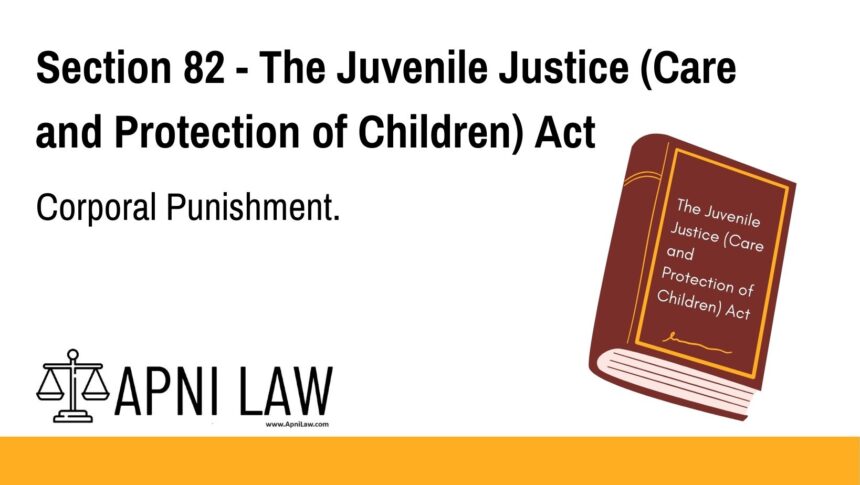Code: Section 82 of the Juvenile Justice Act
(1) Any person in charge of or employed in a child care institution, who subjects a child to corporal punishment with the intent of disciplining the child, shall be liable on the first conviction to a fine of ₹10,000. For every subsequent offence, the punishment may include imprisonment of up to three months, or a fine, or both.
(2) If an employee of the institution is convicted under sub-section (1), that person shall be dismissed from service and banned from working directly with children in the future.
(3) If corporal punishment is reported and the institution’s management fails to cooperate with the inquiry or disobeys the orders of the Committee, Board, Court, or State Government, the person in charge of management shall face imprisonment for at least three years, along with a fine that may go up to ₹1,00,000.
Explanation of Section 82
Section 82 firmly prohibits any form of corporal punishment in child care institutions. It applies to staff, caretakers, and those in supervisory roles. The section aims to protect children from physical harm in environments meant for care and rehabilitation.
Here’s how the law works:
- For the first offence, the person is fined ₹10,000.
- If the offence is repeated, the person may be imprisoned for up to three months, fined again, or both.
- A conviction under this section results in automatic dismissal from service.
- Furthermore, convicted individuals are banned from any future roles involving direct interaction with children.
- If the institution’s management covers up such acts or refuses to cooperate with the investigation, the head of the institution will face at least three years of imprisonment and a fine of up to ₹1,00,000.
By penalizing both individuals and institutions, the law prioritizes the safety and dignity of children in institutional care.
Illustration
Example 1: First-Time Violation
A hostel warden hits a child for not following discipline. On the first conviction, the warden is fined ₹10,000.
Example 2: Repeat Offender
Six months later, the same warden repeats the act. This time, the punishment includes a month of imprisonment and an additional fine.
Example 3: Institutional Negligence
In another case, a report of corporal punishment is ignored by the management. They refuse to assist the authorities. As a result, the institution’s head is sentenced to three years in prison and fined ₹1,00,000.
Common Questions and Answers
1. What is considered corporal punishment under this law?
Corporal punishment includes any physical force used to discipline a child, such as slapping, hitting, or pushing.
2. What is the penalty for the first offence?
A ₹10,000 fine is imposed upon the first conviction.
3. Can the convicted person continue working in child care?
No. A conviction results in immediate dismissal and a permanent ban from working with children.
4. What happens if management doesn’t cooperate during an investigation?
If management obstructs the process or disobeys legal orders, the head of the institution may be imprisoned for a minimum of three years and fined up to ₹1,00,000.
Conclusion
Section 82 reinforces the idea that no child should face violence, especially in places designed for care and protection. It holds both individuals and institutions accountable for abusive behavior and ensures that children grow up in safe, supportive environments. Ultimately, the law promotes discipline through dignity—not force.








